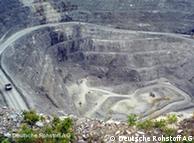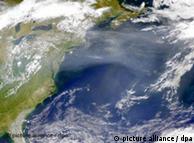CLIMATE | 13.12.2011
Canada quits Kyoto climate change agreement
Canadian Environment Minister Peter Kent announced on Monday that his country was officially withdrawing from the Kyoto protocol. The minister had just returned from UN climate talks in Durban, where delegates reached a last-minute deal on climate change, and agreed to extend the Kyoto accord by five years.
Canada has long complained that Kyoto is unworkable, because it excludes several major emitters of greenhouse gases.
"The Kyoto Protocol does not cover the world's largest two emitters, United States and China, and therefore cannot work," Kent said on Monday. "It's now clear that Kyoto is not the path forward to a global solution to climate change. If anything it's an impediment."
 Peter Kent called the Kyoto protocal an 'impediment'The Chinese government heavily criticized Canada's decision, describing it as "regrettable." Chinese foreign ministry spokesman Liu Weimin said the move went against "efforts of the international community." China has always insisted that as a developing country it should be exempt from binding obligations on emissions.
Peter Kent called the Kyoto protocal an 'impediment'The Chinese government heavily criticized Canada's decision, describing it as "regrettable." Chinese foreign ministry spokesman Liu Weimin said the move went against "efforts of the international community." China has always insisted that as a developing country it should be exempt from binding obligations on emissions.Key industry
Canada is the largest supplier of oil and natural gas to the United States and is keen to procure more crude oil from tar sands in Alberta, which require large amounts of energy to extract.
The center-right government of Prime Minister Stephen Harper is also keen to avoid penalties totaling some $13.6 billion (10.3 billion euros) for failing to reach emission reduction targets by 2012.
"To meet the targets under Kyoto for 2012 would be the equivalent of either removing every car truck, all-terrain vehicle, tractor, ambulance, police car and vehicle off every kind of Canadian road," Kent said.
Opposition from green lobby
Environmentalists were quick to criticize the move.
"It's a national disgrace. Prime Minister Harper just spat in the faces of people around the world for whom climate change is increasingly a life and death issue," said Graham Saul of Climate Action Network Canada.
 Canada wants to exploit its natural resourcesIn Germany, the environment ministry suggested that the Kyoto accord did not go far enough towards a global reduction in greenhouse gases. A spokeswoman for the ministry in Berlin said that without Canada, Russia and Japan, the accord "only encompassed about 15 percent of worldwide emissions." She added that Canada's decision came as no surprise, and emphasized the importance of the Durban deal.
Canada wants to exploit its natural resourcesIn Germany, the environment ministry suggested that the Kyoto accord did not go far enough towards a global reduction in greenhouse gases. A spokeswoman for the ministry in Berlin said that without Canada, Russia and Japan, the accord "only encompassed about 15 percent of worldwide emissions." She added that Canada's decision came as no surprise, and emphasized the importance of the Durban deal.But Eva Bulling-Schröter of Germany's opposition Left party, was far more outspoken, calling Canada's withdrawal "cowardly." She claimed that Canada was trying to shirk its responsibilities with a "flimsy excuse."
The protocol, first drawn up in Japan in 1997, is aimed at combating global warming. Canada's previous Liberal government signed the accord, but politicians have done little to implement it. By 2009, emissions, far from falling, were 17 percent above the 1990 levels, in part because of the expanding tar sands development.
Kent said the Liberals should not have signed up to a treaty they had no intention of respecting.
Canada has the world's third-largest oil reserves, more than 170 billion barrels. Daily production of 1.5 million barrels from the tar sands is expected to increase to 3.7 million in 2025. Only Saudi Arabia and Venezuela have more reserves.
Author: Joanna Impey (AFP, AP, Reuters)
Editor: Andreas Illmer
Editor: Andreas Illmer
dw


No comments:
Post a Comment